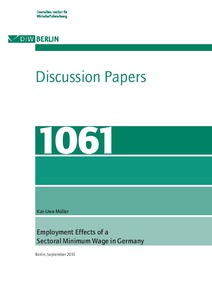The employment effects of a sectoral minimum wage in Germany

Deutsches Institut für Wirtschaftsforschung, Berlin
DIW - Berlin
2010
41 p.
construction industry ; employment ; minimum wage ; statistics
Discussion Papers
1061
Wages and wage payment systems
English
Bibliogr.
"In this paper employment effects of a sectoral minimum wage in the German construction sector are estimated from a single cross-sectional wage distribution using parametric and semi-parametric models. Parametric functional form assumptions seem too restrictive and lead to implausible results. We suggest semi-parametric censored quantile regression models to relax these assumptions and find that employment levels would be 4-5% higher without the minimum wage in the East German construction sector. That the effect for the West is clearly smaller (only 1-2%) is theoretically plausible, since the level of the minimum wage in East Germany was set much higher in relation to the wage distribution. There is heterogeneity hidden in the mean effect: employment losses are mostly borne by young construction workers, employees not covered by collective bargaining agreements and individuals working in small establishments. Although the paper confirms previous findings of a negative employment effect for East Germany, its magnitude is substantially larger than previously estimated."
Digital
The ETUI is co-funded by the European Union. Views and opinions expressed are however those of the author(s) only and do not necessarily reflect those of the European Union or the ETUI.